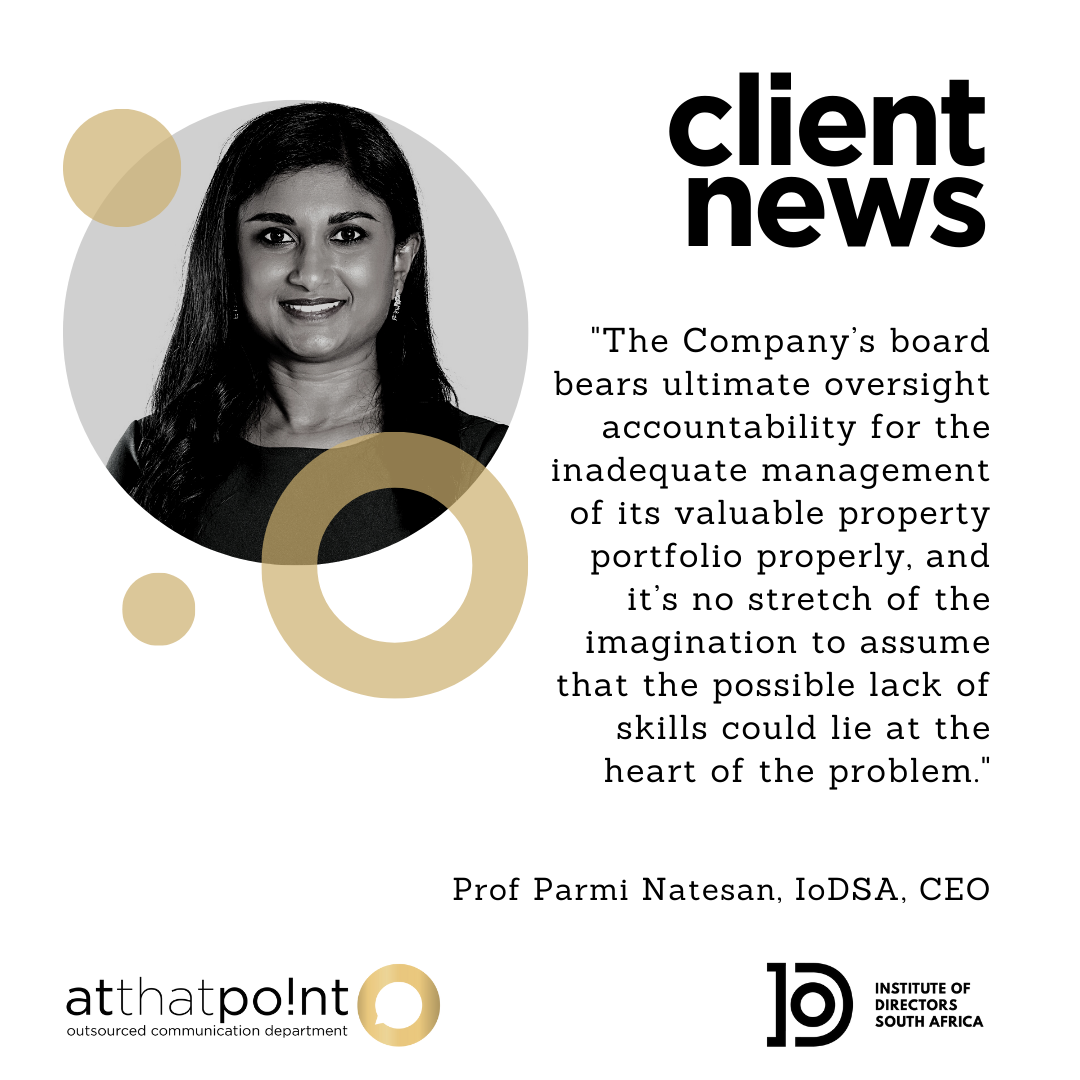 A slew of recent media reports indicate that the Johannesburg Property Company has appointed several individuals to its board who, on the face of it, do not possess the necessary skills to govern a significant municipal entity with a property portfolio worth an estimated R8.7 billion. These appointments, which are reported to include a receptionist, a cashier and a person without matric, appear to have been made unilaterally by the MMC for Economic Development. “The Johannesburg Property Company manages 30 000 properties, many of which have reportedly been hijacked—in fact, the devastating Albert Street fire that claimed 77 lives was apparently one of them. The Company’s board bears ultimate oversight accountability for the inadequate management of its valuable property portfolio properly, and it’s no stretch of the imagination to assume that the possible lack of skills could lie at the heart of the problem,” says Professor Parmi Natesan, CEO of the Institute of Directors in South Africa (IoDSA). “Media reports also suggest that the MMC treats the company as a private fiefdom to which political cadres are appointed, based presumably on their loyalty and political importance, and not necessarily their skills as directors. The sad state of municipal entities across the city, and indeed the country, shows the devastating consequences of flouting robust nomination processes for board and senior executive positions.” The IoDSA has repeatedly pointed out that public sector entities face particular challenges when it comes to appointing competent boards. The state, as the sole shareholder, has not been seen to follow best practice in this regard. According to King IV, directors should have the correct mix of skills and experience to discharge their legal duties. A robust and transparent nomination process that includes in-depth vetting of candidates should be followed, says Professor Natesan. “Without such a nomination process, the board members can hardly act competently and independently in order to fulfil their legal duties, which are to the company and not to whoever appointed them,” Professor Natesan says. “I wonder if these directors realise that they can be held personally liable for any untoward decisions they make. Modern-day directors need not only business and sector skills and experience, but also finely honed governance expertise.” The performance of local government generally, including municipal entities like the Johannesburg Property Company, has a direct bearing on service delivery and thus on the most vulnerable sectors of society. The Auditor-General’s Consolidated General Report on Local Government Audit Outcomes 2021-22, an annual report on audit outcomes for entities governed by the Municipal Finance Management Act, notes that fruitless and wasteful expenditure continues to balloon. It doubled in 2021-22 to R4.74 billion, plus an estimated R5.19 billion in financial loss from non-compliance and fraud. It is clearly imperative that municipalities and municipal entities are properly governed, and the Auditor-General highlights the need for competent people to be appointed to municipal structures, and for governance to be strengthened. “The Johannesburg Property Company is just one of many municipal entities that are perceived to be – and often are – underperforming, with one of the reasons for that underperformance reasonably assumed to be that board appointments are not necessarily made with the entity’s needs in mind,” she argues. “These entities need proper governance and strong oversight or they are likely to fail to do their jobs, with disastrous consequences for society and our country.” ENDS MEDIA CONTACT: Idéle Prinsloo, [email protected], 082 573 9219, www.atthatpoint.co.za For more information on the IoDSA please visit: Website: www.iodsa.co.za Twitter: @The_IoDSA LinkedIn: Institute of Directors in South Africa Company Page Facebook: Institute of Directors South Africa
0 Comments
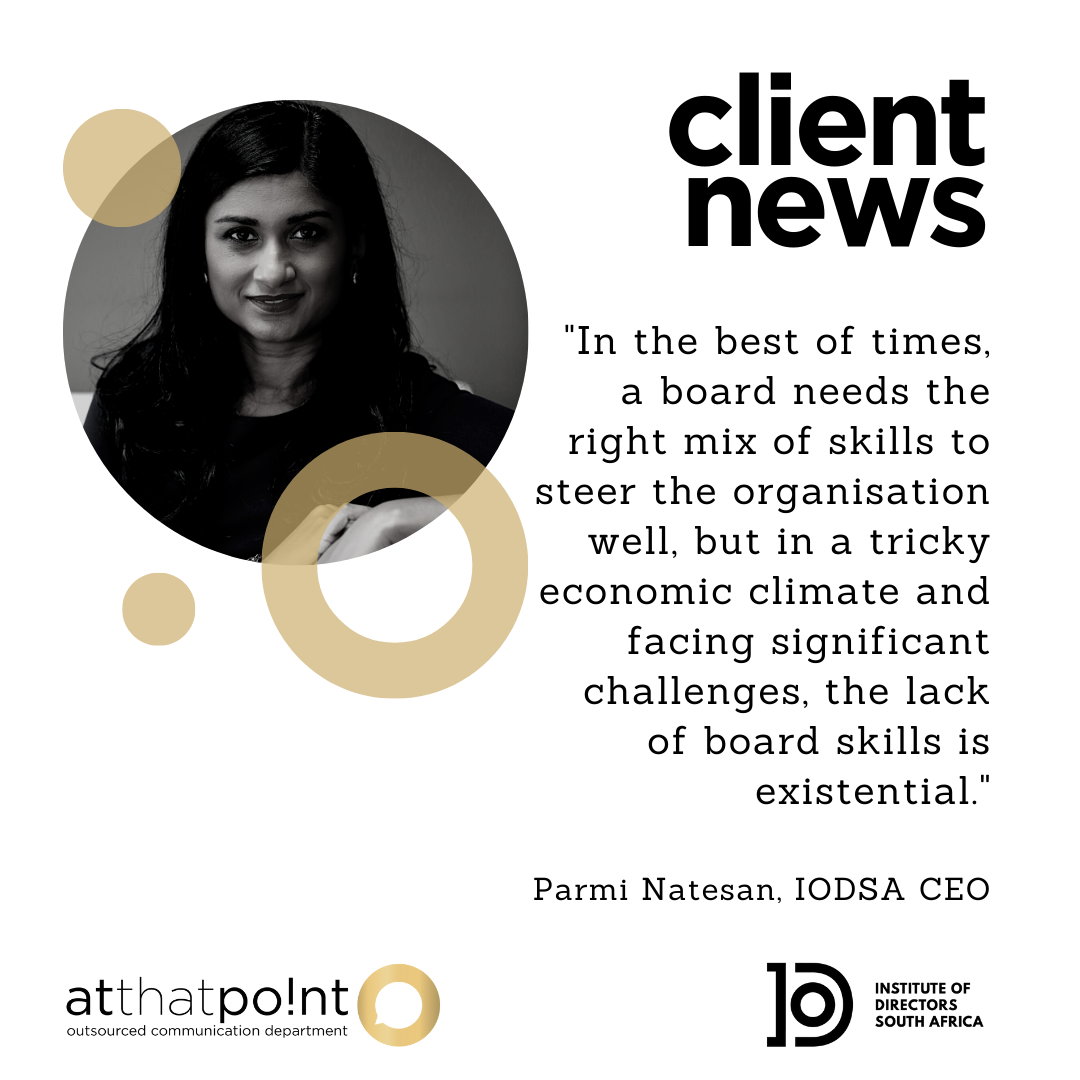 Futuregrowth Asset Management recently raised concerns about the inordinate time it is taking to fill six vacant positions on the Transnet board. These concerns are valid and point to governance issues that should be seriously considered by all boards, says Parmi Natesan, CEO, Institute of Directors in South Africa (IoDSA). “Futuregrowth’s analysis shows that the failure to fill six vacancies in a 12-person board has made it less able to tackle the serious challenges the company faces—a matter of considerable concern given its pivotal role in our economy,” she points out. “In the best of times, a board needs the right mix of skills to steer the organisation well, but in a tricky economic climate and facing significant challenges, the lack of board skills is existential.” For a start, Transnet’s sparsely populated board table means that important board committees like the audit committee, social and ethics committee, and risk committee could be missing critical skills. These committees fulfil vital roles in the governance of the organisation, and particularly in relation to its ability to rise to the challenges it faces. “Organisations and board chairs must pay particular attention to the need for the board to have, in the words of King IV, ‘the appropriate balance of knowledge, skills, experience, diversity and independence for it to discharge its governance role and responsibilities objectively and effectively’ (Principle 7),” Natesan says. A related issue is the fact that the terms of office of the six remaining non-executive directors will expire in May 2024. While the principle of rotating board members in a staggered fashion to ensure that skills are renewed and diversity improved is a good one, it is clearly counterproductive for so many board members to leave at once. “We see this kind of mass reshuffling of boards particularly in the public sector. The motivation behind rotation is good, but it needs to be handled intelligently to ensure that invaluable institutional memory is not lost,” she says. “Organisations need to focus on striking a balance between continuity and renewal.” Another important consideration is succession planning. If board members are going to be rotated regularly, as best practice suggests, then the organisation needs to ensure that individuals with the right skills—including professional directorial skills—are ready in the wings. Succession planning thus needs to proceed in parallel with an ongoing skills audit to ensure that the board understands what skills it needs, and that the individuals nominated for it have them. “Nobody in South Africa at least now doubts the important role that governance and oversight play in ensuring organisational health and effectiveness,” Natesan sums up. “The corollary—that the board needs to have the right mix of skills in order to fulfil this vital function—is equally true. ENDS MEDIA CONTACT: Stephné du Toit, [email protected], 084 587 9933, www.atthatpoint.co.za For more information on the IoDSA please visit: Website: www.iodsa.co.za Twitter: @The_IoDSA LinkedIn: Institute of Directors South Africa Company Page Facebook: Institute of Directors South Africa 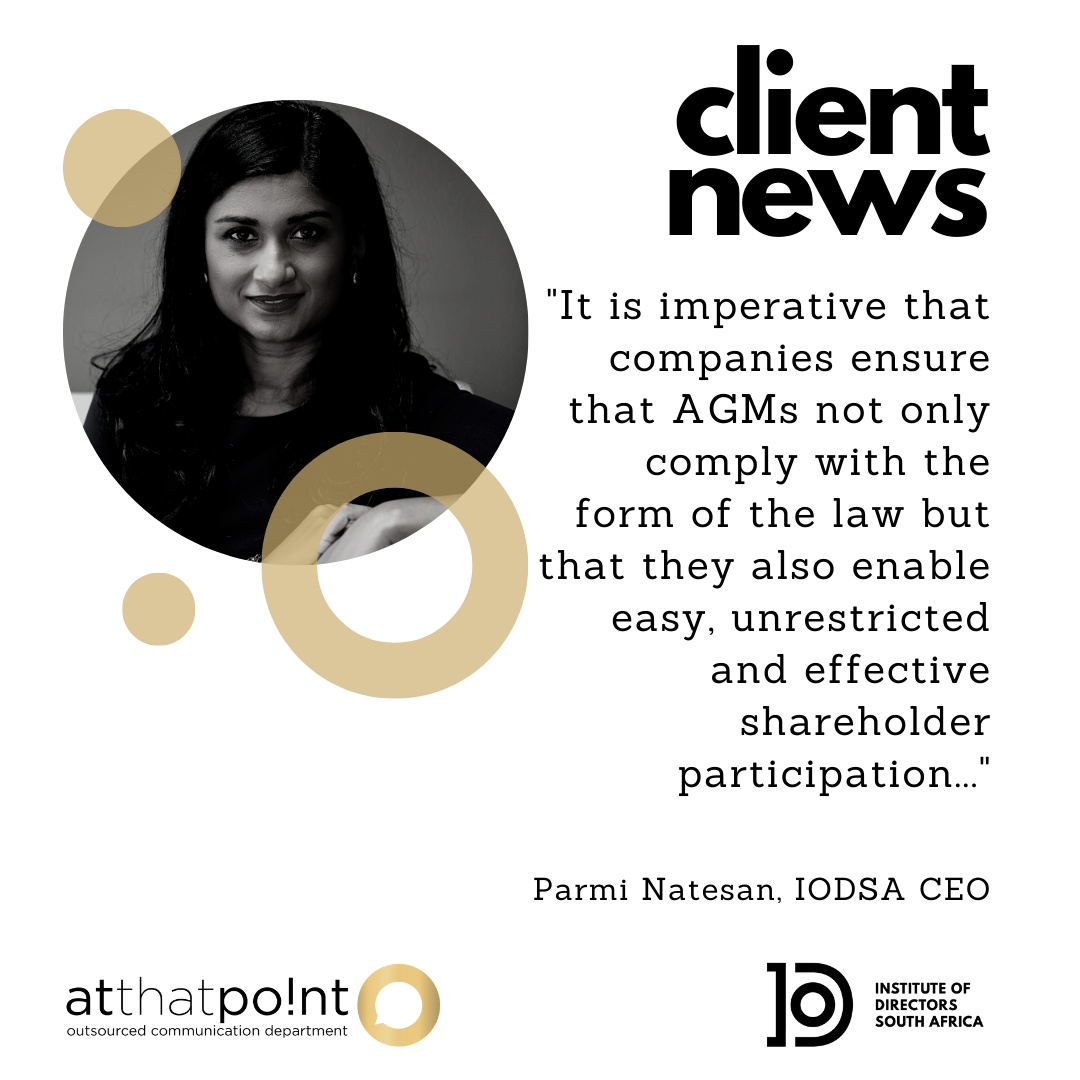 An Annual General Meeting (AGM) of a company that restricts shareholders to use only text-based communication does not constitute an AGM for the purposes of the Companies Act 71 of 2008. This is according to the legal opinion of the Companies and Intellectual Property Commission (CIPC) on holding AGMs via electronic means. According to the opinion, a company holding an AGM with shareholders attending online must allow those shareholders to verbally ask questions in real-time and without an intermediary. This aligns with the IoDSA’s previous comments on this matter, in which we noted that whilst the section does not specifically state that verbal communication is required, the spirit of the section should be interpreted to allow sufficient engagement at the AGM, as would have taken place had the meeting taken place in-person. The Institute of Directors in South Africa (IoDSA) welcomes this clarification from the CIPC. “If you consider the Companies Act and King IV in substance over form, shareholders should have a right to be heard at an AGMs,” says Parmi Natesan, CEO of the IoDSA. “It is imperative that companies ensure that AGMs not only comply with the form of the law but that they also enable easy, unrestricted and effective shareholder participation during the meetings, in substance.” “Whilst engagement between companies and shareholders can take place at any time, the AGM is the key point of formal engagement and the main opportunity for shareholders to exercise their voting rights, raise concerns and ask questions,” explains Natesan. A key, but often neglected voting resolution at AGMs is the appointment of directors. Shareholders have the legal right and obligation to appoint directors to oversee the company. Those directors, in turn, have a legal obligation to act in the company’s best interests and can be held personally liable if they do not do so. A big emphasis at AGMs should therefore be ensuring that the right people are appointed to the board and that they are held properly accountable. Shareholders need to be confident that they are appointing directors in whom they have full trust. They then need to allow these directors to exercise their discretion in the fulfilment of their duties while holding those directors accountable. They should also consider when the removal of a director is appropriate as this is another powerful and important tool that a shareholder has to protect the company’s interests. In relation to the AGM resolution on director appointments, questions asked should therefore be aimed at determining whether board members have the necessary knowledge, skills, experience, independence, personal competencies, track record and even sufficient time available to effectively serve on the board. “In summary, shareholders now have confirmation of their right to be heard at virtual AGMs and are encouraged to use their voice effectively in exercising their voting rights and holding the directors accountable,” says Natesan. ENDS MEDIA CONTACT: Stephné du Toit, [email protected], 084 587 9933, www.atthatpoint.co.za For more information on the IoDSA please visit: Website: www.iodsa.co.za Twitter: @The_IoDSA LinkedIn: Institute of Directors South Africa Company Page Facebook: Institute of Directors South Afric A recent editorial in Business Day raised a perennial governance hot potato: just how many boards should a single individual be able to serve on? The tenor of the article was that the current chair of Capitec should focus on that role, and risked being distracted by chairing two other boards as well.
“The view that the more complex and large an institution is, the more time the chair or board member should have to devote to it has some merit,” says Parmi Natesan, CEO, the Institute of Directors in South Africa. “For example, the decision by the current chair of Eskom to resign as chair of a large bank to concentrate on leading the power utility’s board was probably a wise move. “However, because organisations are of varying sizes and degrees of complexity, and individuals have different capacities, the IoDSA does not believe it makes sense to attempt to create a hard-and-fast rule about how many boards an individual should be able to chair or, indeed, sit on.” She argues that it remains up to each organisation to determine how much time each board member’s role requires, and to ensure that current or prospective board members can commit to that. The individual director’s ability, experience and capacity would also be factors to consider. In addition, board chairs and directors (especially those serving on key board committees) need to have the flexibility to ramp up the time they devote to their work during periods of crisis. Individuals who are fully committed will not have that flexibility. In view of the growing realisation that governance plays a crucial role in ensuring corporate sustainability, investors are starting to take note of how many boards non-executive directors serve on. In the United Kingdom and United States, institutional investors (often via proxy services) oppose the appointment of directors with more than five board seats. In India, by contrast, the legal limit of directorships is 20. King IV addresses the problem by recommending transparency, advising independent non-executive directors to detail their other board commitments and to provide a written undertaking that they have enough time to discharge their board responsibilities (Principle 7, Recommended Practice 18). “Given the importance of the director’s role, it might make sense for boards to formalise the minimum amount of time that each role requires. The overriding principle is that the issue needs to be thoroughly ventilated and minuted to ensure there is consensus about what the role demands, and whether each director can give the time needed,” she concludes. “The Nominations Committee also plays a key role in monitoring the attendance and involvement of board members, and should act swiftly where there are capacity concerns.” ENDS MEDIA CONTACT: Stephné du Toit, [email protected], 084 587 9933, www.atthatpoint.co.za For more information on the IoDSA please visit: Website: www.iodsa.co.za Twitter: @The_IoDSA LinkedIn: Institute of Directors South Africa Company Page Facebook: Institute of Directors South Africa  Just days after Mpho Phalaatse was removed as Johannesburg’s mayor, a letter to all municipal entities surfaced on social media, in which the Acting City Manager of Johannesburg instructs the boards of municipal entities to cease holding any “strategic sessions, including the [sic] Board and Sub-Committee meetings” until further notice. Boards may seek permission to hold meetings to consider any critical reports. All strategic and programme management decisions are specifically placed in abeyance, and any decisions taken since September 2022 are also put on ice. “If this letter is indeed legitimate, it’s hard not to see this move as a departure from good governance. The content of the letter also raises once again all the accountability issues that the IoDSA has consistently highlighted in relation to state- and municipality-owned entities,” says Parmi Natesan, CEO, Institute of Directors in South Africa (IoDSA). “The shareholder may appoint the boards of these entities, but once appointed these boards have a legal duty to fulfil their obligations as set out in the relevant legislation and in the King Report, and to act in the best interests of the entity.” The IoDSA has repeatedly pointed out that many of the issues that plague state- and municipality-owned entities can be traced back to the improper exercise of power by the shareholder. By usurping what should properly be the functions of the board, the shareholder makes it impossible for the board to be held accountable, or for the board to hold management accountable. “Boards are supposed to act independently, but this letter clearly demonstrates that, in the City of Johannesburg at least, they are being prevented from doing so,” she says. Ms Natesan goes on to point out that forbidding the boards of the municipal entities to meet means that they cannot fulfil their duties and exercise oversight properly. “Municipalities are commonly known for lack of service delivery, as well as fruitless and wasteful expenditure, so preventing boards and audit committees, from meeting and thus exercising oversight, will potentially open the door to even more of the same,” she comments. It is questionable whether any appointed board can be prevented from discharging its legal duties. Time will tell whether such action will stand up to scrutiny and legal challenge. “King IV makes it clear that boards should hold as many meetings as necessary to discharge their obligations, so presumably they cannot be prevented from doing that,” she concludes. “This gross interference in the board’s exercise of its governance function is a terrible way for the City’s new administration to begin. The IoDSA urges the new mayor and his executive to take speedy action to confirm their adherence to the principles of good governance as outlined in the legislation and King IV.” ENDS MEDIA CONTACT: Stephné du Toit, [email protected], 084 587 9933, www.atthatpoint.co.za For more information on the IoDSA please visit: Website: www.iodsa.co.za Twitter: @The_IoDSA LinkedIn: Institute of Directors South Africa Company Page Facebook: Institute of Directors South Africa 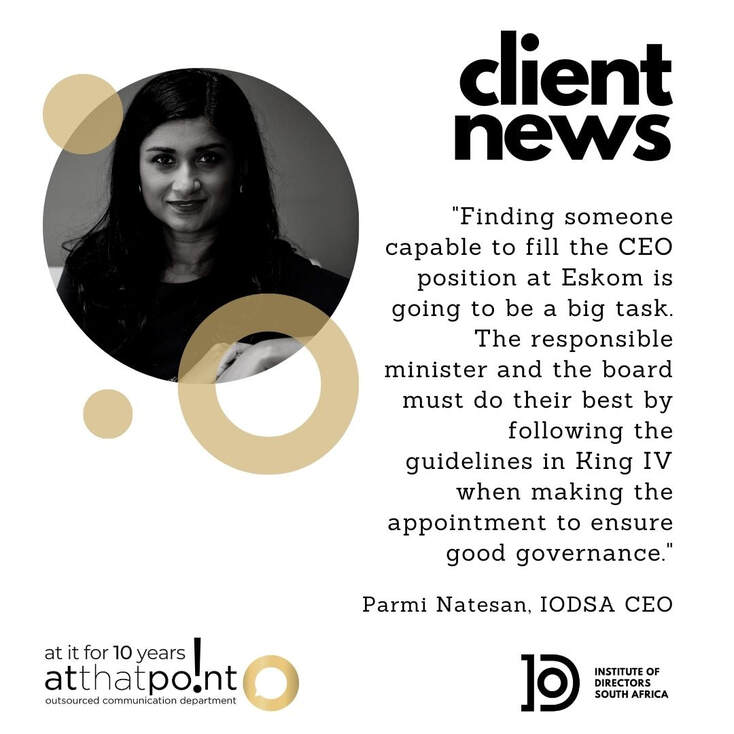 The current crisis at Eskom has a number of governance lessons for South Africa, one of which is the vital importance of proper succession planning for key senior positions, says Parmi Natesan, CEO of the Institute of Directors in South Africa (IoDSA). “The imminent departure of both the CEO and COO of Eskom in the next few months, with no obvious successors being communicated, raises concerns,” she says. “Now is really not the time for the two top positions—and many other senior management ones—to be vacant. In fact, Ms Natesan continues, the Eskom Statement on 14 December 2022 makes it clear that Mr De Ruyter’s agreement to stay on beyond the required 30-day notice period is welcome because there seems to be no planned successor for his position. The statement quotes the board chair as follows: “Mr De Ruyter has agreed to stay for an additional period beyond the stipulated 30-days’ notice to ensure continuity while we urgently embark on a search for his successor”. It remains to be seen whether there are plans in place for a succession to the COO, Jan Oberholzer, who is due to retire in April—a month after Mr De Ruyter leaves—and it is also unclear as to whether he will remain available to hand-over to a successor when one is appointed. King IV specifically states that the board should satisfy itself that there is succession planning for the CEO and other executive positions in place to provide continuity of executive leadership. Succession planning should be reviewed periodically and should provide for both succession in emergency situations and succession over the longer term. This should include the identification, mentorship and development of future candidates. The IoDSA has repeatedly said that the way the CEOs of key state-owned enterprises have been appointed were not in line with good governance as outlined in King IV. Too often, the powerful single shareholder bypasses the board in making the appointment. This leads to problems because the CEO is seen as a representative of the shareholder, and thus sometimes does not feel accountable to the board. Skewed reporting lines set the board and executive management up for conflict, with bad results for the organisation. “Finding someone capable to fill the CEO position at Eskom is going to be a big task. The responsible minister and the board must do their best by following the guidelines in King IV when making the appointment to ensure good governance,” she concludes. “Good governance is the foundation of good organisational performance—and the converse is also true.” ENDS MEDIA CONTACT: Stephné du Toit, [email protected], 084 587 9933, www.atthatpoint.co.za For more information on the IoDSA please visit: Website: www.iodsa.co.za Twitter: @The_IoDSA LinkedIn: Institute of Directors South Africa Company Page Facebook: Institute of Directors South Africa 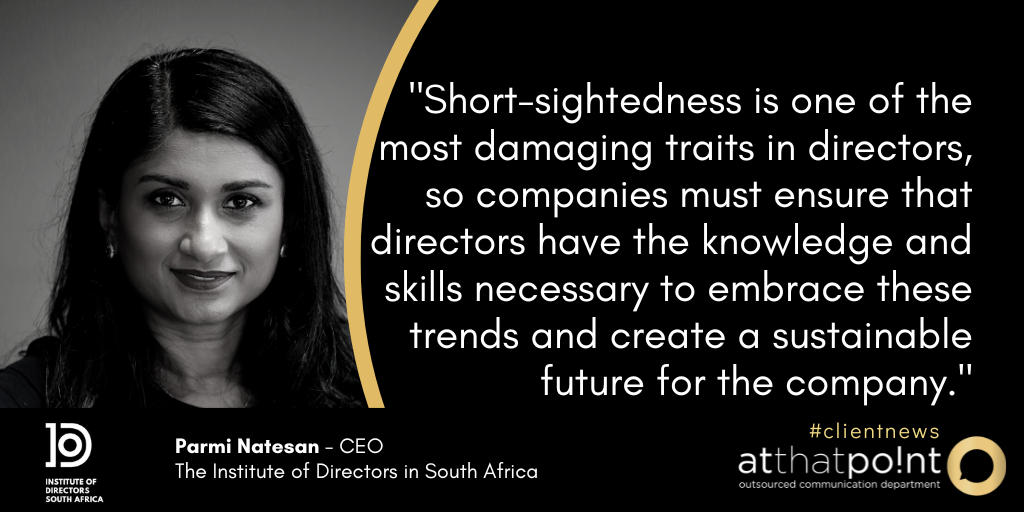 The Institute of Directors in South Africa (IoDSA) lays out five key trends for boards and directors to focus on in 2023. Parmi Natesan, CEO of the IoDSA argues that boards need to begin planning their agendas for 2023 to ensure they are on top of these trends—and that their members have the requisite skills to fulfil their duties. “Short-sightedness is one of the most damaging traits in directors, so companies must ensure that directors have the knowledge and skills necessary to embrace these trends and create a sustainable future for the company,” she says. The five disruptive trends are: Less time, more pressure. Businesses have to respond fast to a rapidly changing global environment that is increasingly automated - directors are under increasing pressure to take important decisions rapidly. The chair’s role becomes even more critical in striking a balance between facilitating an inclusive exchange of views while preventing unprepared directors or individual agendas to hijack or prolong the board’s deliberations. By the same token, directors must be properly prepared to make decisions on agenda items. Less paper, more AI. Boards will specifically need to acquire the skills to interpret real-time data accurately in order to incorporate it into their decision-making process. They can no longer simply base their deliberations on the board pack but will need to ensure that artificial intelligence (AI) is effectively used to process large amounts of data to deliver relevant insights. In a similar vein, directors will need to allocate resources to streamline business processes within the company using AI and other Fourth Industrial Revolution technologies. Less focus on operational issues, more oversight. The traditional view that extensive operational or managerial experience makes for a good director must now be discarded once and for all—directors need a distinct knowledge base and skill set. “Continuing learning is vital. The IoDSA’s advice is to plan training topics into the meeting calendar for the year and, if necessary, integrate training sessions into the board’s or committee’s meeting agenda,” Ms Natesan says. “The IoDSA can help by providing this phased and structured learning via two-hour snapshot training sessions.” Less stability, more agility. Today’s world is volatile, uncertain, complex and ambiguous (VUCA), with economic and geopolitical issues more intertwined and harder to interpret than ever. Long and complex supply chains also expose companies to contingent risks and thus require extensive planning to ensure alternatives are in place. In this VUCA world, the ability to respond rapidly and strategically is critical. Less greed, more green. Environmental issues, including but not limited to climate change, should be prominent on the board agenda for a multitude of reasons. Directors need to have the skills not only to understand these complex issues but also how to measure and report credibly on the company’s progress in meeting its environmental targets. ENDS MEDIA CONTACT: Stephné du Toit, [email protected], 084 587 9933, www.atthatpoint.co.za For more information on the IoDSA please visit: Website: www.iodsa.co.za Twitter: @The_IoDSA LinkedIn: Institute of Directors South Africa Company Page Facebook: Institute of Directors South Africa 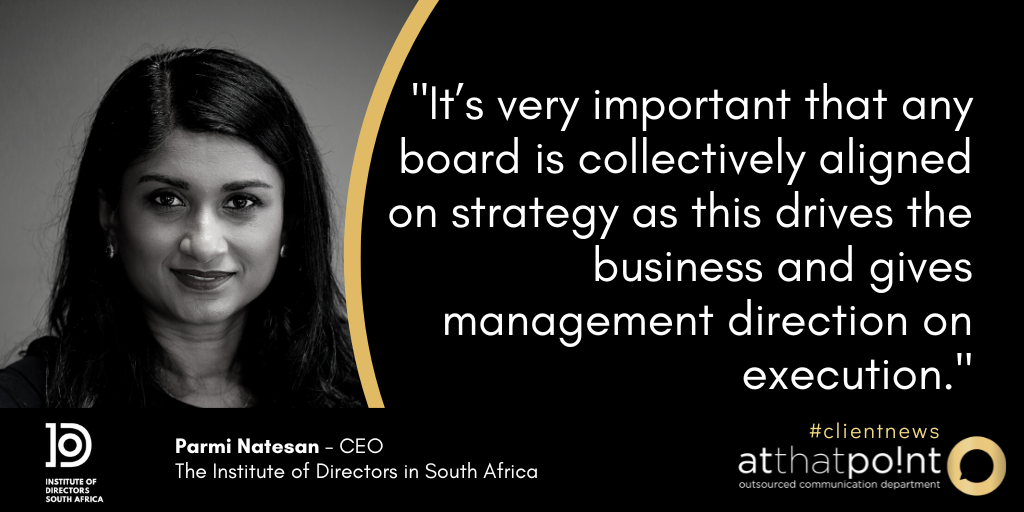 Events at Huge Group, as reported in the media, hold important governance lessons for all organisations, says Parmi Natesan, CEO: the Institute of Directors in South Africa (IoDSA). Reports stated that at a recent board meeting, the chairman and two other directors resigned with immediate effect, apparently over disagreements relating to corporate strategy. “It’s very important that any board is collectively aligned on strategy as this drives the business and gives management direction on execution. It’s therefore not surprising that vehement disagreement on strategy would lead to a parting of the ways,” comments Ms Natesan. “Another obvious takeaway is that the departure of three experienced non-executive directors at once is a major loss of institutional knowledge for any company, something that it will take a long time to recover from—a well-thought-out board succession plan is clearly vital.” When the news of the resignations broke, the simultaneous appointment of three substitute directors was also announced. On the one hand, this may indicate that a succession plan was indeed in place, or it may have been just quick action, Ms Natesan believes. “Whilst the speed of finding replacements is to be applauded, one has to consider whether this was a missed opportunity for better demographic diversification on the board. After the new appointments, the board’s composition remains all male and majority white—this despite both the JSE Listings Requirements and King IV referring to targets and reporting on racial and gender diversity on boards,” she says. There is widespread agreement that a diverse board does more than tick boxes and create a good impression. For example, 86% of respondents in a recent research survey believe that board diversity contributes to better board performance, while 77% link board diversity and improved corporate performance. Overall, 73% of respondents noted that their company was taking action to increase board diversity. The research also indicates that investors are starting to ask questions about board diversity. Globally, just over a third (35%) of investors request such information, with this question most likely to be asked in Europe (43%). Investors are most likely to ask about boardroom diversity in relation to mega-cap (71%) and large cap (57%) companies.[1] “Common sense tells us that the more lenses through which a board can examine the world, the better. There’s also interesting research that links a company’s financial performance and gender and skill diversity on the board,”[2]concludes Ms Natesan. “This is a complex topic, but it’s clear that boards need to investigate it fully and, most importantly, have a succession plan that reflects their conclusions and resulting diversity goals.” [1] Corporate Secretary, “Boardroom diversity: From disclosure to recruitment”, available at https://content.corporatesecretary.com/story/cs-boardroom-diversity-from-disclosure-to-recruitment/page/1. [2] Khaled Hosny, Adel Elgharbawy, “Board diversity and financial performance: empirical evidence from the United Kingdom”, Accounting Research Journal (17 June 2022), available at https://www.emerald.com/insight/content/doi/10.1108/ARJ-02-2020-0037/full/html. ENDS MEDIA CONTACT: Stephné du Toit, [email protected], 084 587 9933, www.atthatpoint.co.za For more information on the IoDSA please visit: Website: www.iodsa.co.za Twitter: @The_IoDSA LinkedIn: Institute of Directors South Africa Company Page Facebook: Institute of Directors South Africa 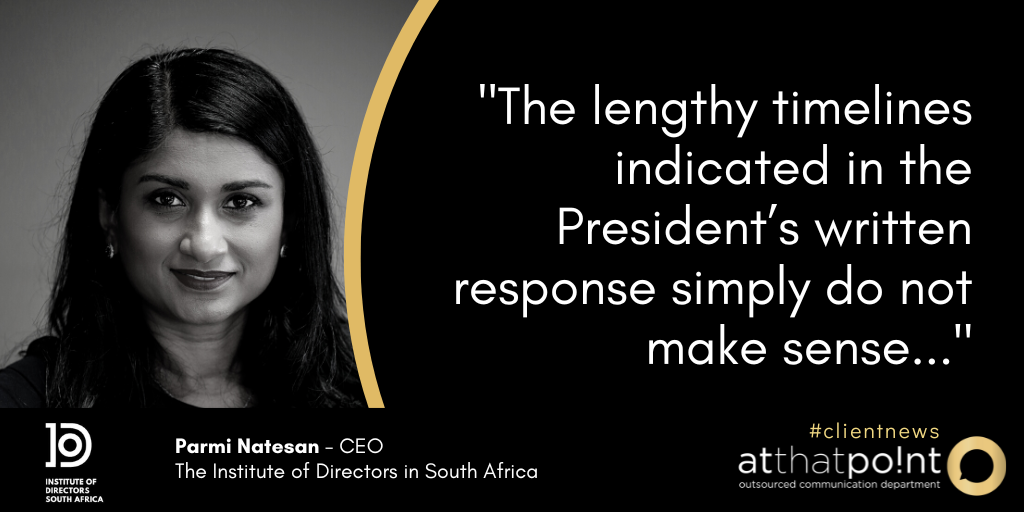 In his long-awaited plan to address the Zondo Commission’s recommendations, the President has set unwarrantedly long timelines in place for the establishment of better processes for selecting board members for state-owned enterprises (SOEs), says Parmi Natesan, CEO of the Institute of Directors in South Africa (IoDSA). “The Zondo Commission quite rightly found that the appointment and removal of board members and senior executives are being manipulated to facilitate state capture. This is an issue that the IoDSA has been highlighting for several years now and, more to the point, we have put in a lot of work with Government to provide solutions,” she says. “The lengthy timelines indicated in the President’s written response simply do not make sense, especially given the urgency of the matter.” In his response, the President indicates that Government accepted the need for “a process for the appointment of boards of state-owned enterprises that is not open to manipulation”. This process will involve independent panels with the appropriate technical expertise to recommend suitable candidates. Crucially, the “Guide for the Appointment of Persons to Boards and Chief Executive Officers of State-Owned and State-Controlled Institutions” that such panels would use will only be finalised in the 2023/24 financial year. “The President’s timeline is too long given the urgent need to begin repairing our SOEs; it’s also unwarranted because the Guide was apparently finalised in early 2019 after input from the IoDSA, among other organisations,” says Parmi Natesan, CEO of the IoDSA. “I can accept that there would be a need to revisit the document in the light of the Zondo Report, but this could be done rapidly. The IoDSA stands ready to work with the Department of Public Service and Administration to get this done, and certainly before the end of the current financial year. The work is largely done, assuming that the recommendations originally made by the IoDSA are in the existing version of the guide, why the delay?” She adds that she assumes that the independent panel would include representation from the IODSA which represents directors and is responsible for setting and maintaining the standards of professionalism amongst its members. The IoDSA is also the custodian of the King Code of Corporate Governance, which also continues to provide internationally respected guidance, including the governance of SOEs. The government also proposes the establishment of a central database of potential candidates, but this is again a duplication of work that has already been done, Ms Natesan continues. The IoDSA’s database of individuals who have obtained one of its two certifications—Certified Director and Chartered Director—already exists. These certifications offer a way to identify individuals who have been found to possess the professional skills and personal qualities necessary to act as directors based on the IoDSA’s Directorship Competency Framework. “I’m sure I don’t speak just for the IoDSA when I say that we are growing weary of responding to the Government’s requests for help in sorting out the governance mess at the SOEs and not seeing any action,” Ms Natesan concludes. “We implore the government not to reinvent the wheel here—much of the work needed to put a proper process for making credible board appointments is already done. The country cannot afford any further delay.” [1] The full text of the speech is available at https://www.gov.za/speeches/president-cyril-ramaphosa-response-president-cyril-ramaphosa-commission-inquiry-allegations. ENDS MEDIA CONTACT: Stephné du Toit, [email protected], 084 587 9933, www.atthatpoint.co.za For more information on the IoDSA please visit: Website: www.iodsa.co.za Twitter: @The_IoDSA LinkedIn: Institute of Directors in South Africa Company Page Facebook: Institute of Directors South Africa The full text of the speech is available at https://www.gov.za/speeches/president-cyril-ramaphosa-response-president-cyril-ramaphosa-commission-inquiry-allegations. UCT Council reports demonstrate the importance of following good governance practices—IoDSA11/10/2022 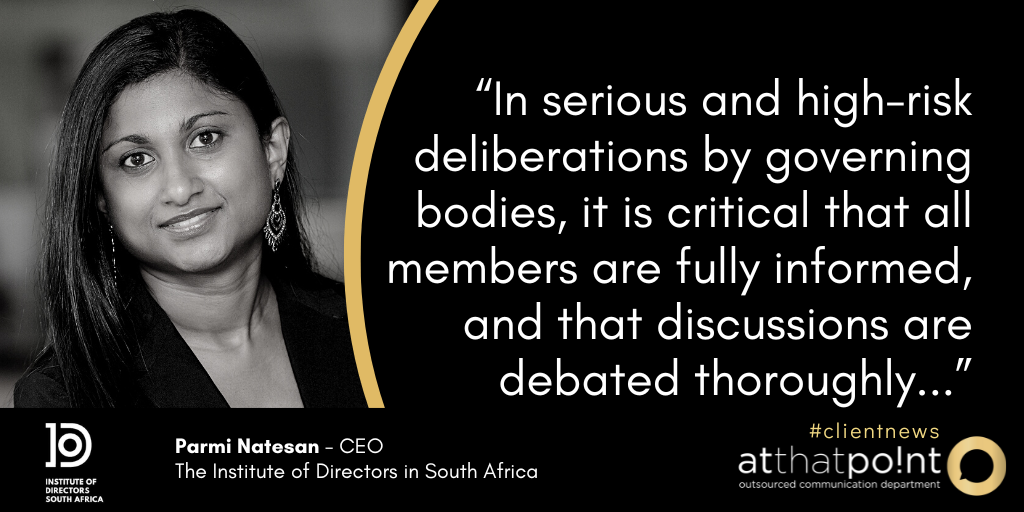 Reports of the unfolding developments at the University of Cape Town suggest deviations from governance best practice, says the Institute of Directors in South Africa (IoDSA). These include that the UCT Council “was split down the middle about the need for an independent judicial commission of enquiry into allegations of mismanagement and poor corporate governance”,[1] and that potentially implicated members of the Council were allowed to cast a vote in the matter. A key principle of good governance is that individuals on governing bodies need to be aware of conflicts of interest, and declare them upfront. Conflicted governing-body members should then recuse themselves from any business or decisions that relate to their conflict. King IV makes this very clear. Principle 1 of King IV is that “The governing body should lead ethically and effectively”, with Recommended Practice 1 (a)(ii) reading: “Members of the governing body should avoid conflicts of interest. In cases where a conflict cannot be avoided, it should be disclosed to the governing body in full at the earliest opportunity, and then proactively managed as determined by the governing body and subject to legal provisions.” An IoDSA guidance note goes on to advise that “A key function of a chair is to manage conflicts of interest. It is not sufficient merely to table a register of interests. All internal and external legal requirements must be met. The chair must ask affected directors to recuse themselves from discussions and decisions in which they have a conflict unless they are requested to provide specific input, in which event they should not be party to the decision.” In this instance, if the reports of potentially implicated Council members being allowed to vote on a matter that concerned them intimately are true, this would constitute a departure from governance best practice. Certainly, a large section of the Council seems to believe that such an unethical decision was taken, and has gone public with its disagreement. This in turn is attracting unfavourable media attention, and may imperil the ability of the governing body to function effectively in the future. Whatever the rights and wrongs, the very existence of such a profound split in a governing body on such an important matter is also a concern. “In serious and high-risk deliberations by governing bodies, it is critical that all members are fully informed, and that discussions are debated thoroughly and ultimately culminate in a decision that has the backing of the entirety, or at least the vast majority, of the governing body which is collectively responsible,” concludes Ms Natesan. [1] Andriaan Basson and Marvin Charles, “UCT crisis deepens as 13 top council members slam ‘irregular, flawed’ meeting”, News 24 (7 October 2022), available at https://www.news24.com/news24/southafrica/news/breaking-uct-crisis-deepens-as-13-top-council-members-slam-irregular-flawed-meeting-20221007. ENDS MEDIA CONTACT: Stephné du Toit, [email protected], 084 587 9933, www.atthatpoint.co.za For more information on the IoDSA please visit: Website: www.iodsa.co.za Twitter: @The_IoDSA LinkedIn: Institute of Directors South Africa Company Page Facebook: Institute of Directors South Afric |
Archives
July 2024
Categories
All
|

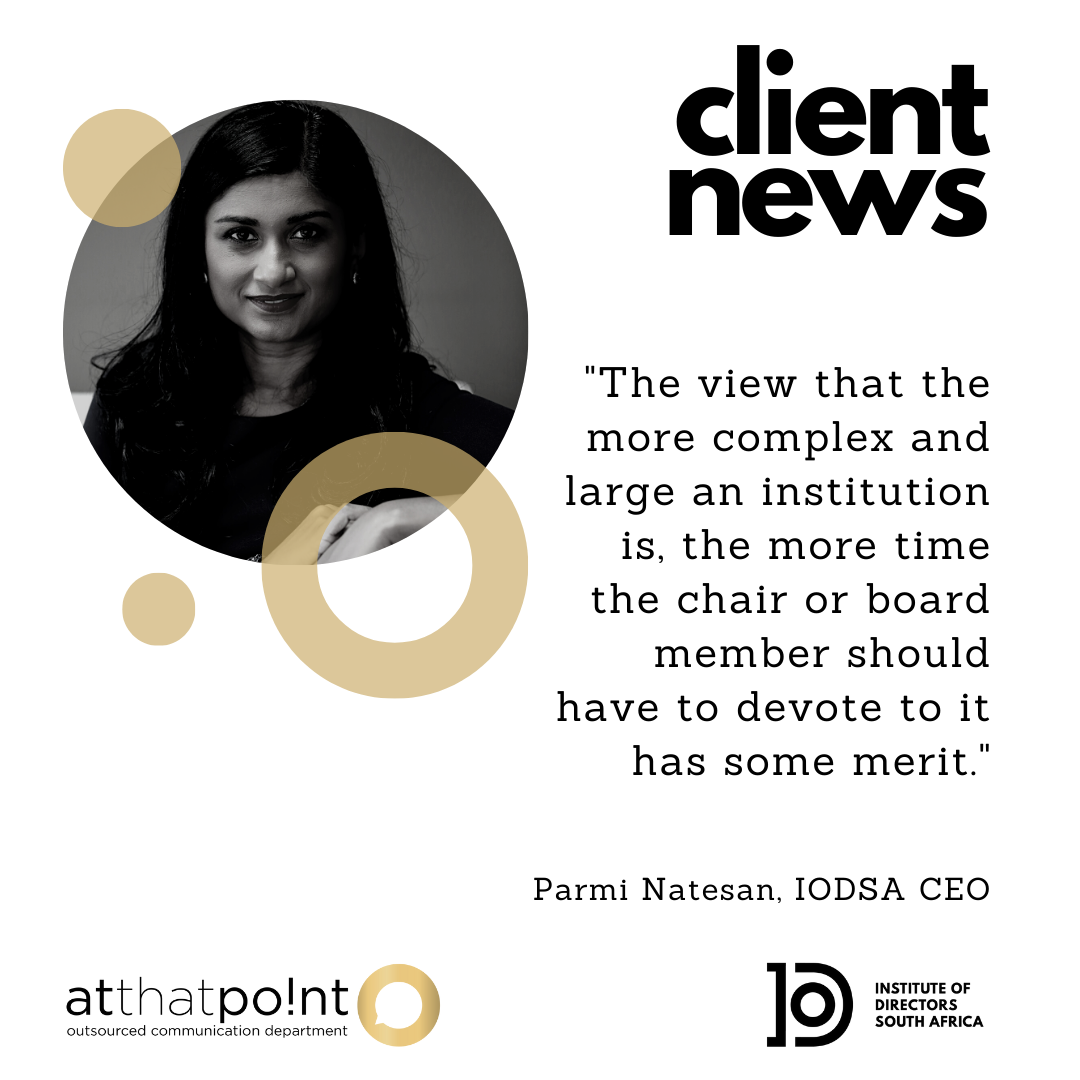
 RSS Feed
RSS Feed